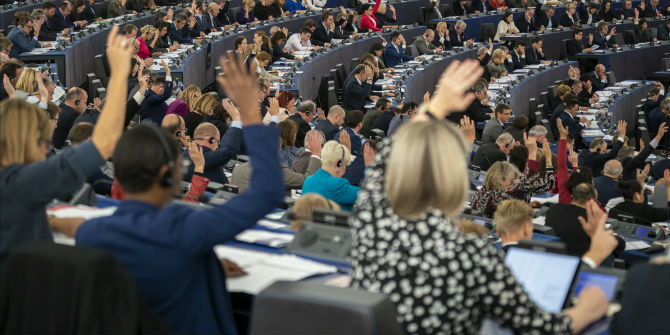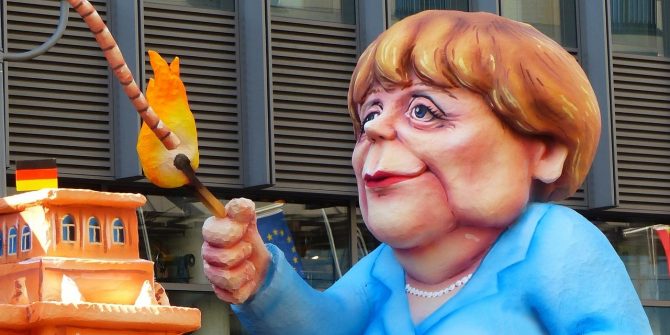 In the rest of the EU, Euroscepticism is driven by particular complaints and resentments – some of which are shared by British Eurosceptics, and others (such as unhappiness at the Greek bailout) which are local. Simona Guerra (University of Leicester) reports on a recent conference in Bratislava, which looks at the forms Euroscepticism has taken among Latvians, Slovakians, Germans and Austrians since the economic crisis.
In the rest of the EU, Euroscepticism is driven by particular complaints and resentments – some of which are shared by British Eurosceptics, and others (such as unhappiness at the Greek bailout) which are local. Simona Guerra (University of Leicester) reports on a recent conference in Bratislava, which looks at the forms Euroscepticism has taken among Latvians, Slovakians, Germans and Austrians since the economic crisis.
Public Euroscepticism is persistent and embedded across the EU. It peaked with the 2016 UK referendum (FitzGibbon 2013a,; Usherwood 2013; Startin and Usherwood 2013, Brack and Costa 2012) and was discussed at the EU-funded CODES (Comprehending and Understanding Euroscepticism) conference in Bratislava in December 2017). CODES brings together research partners from Austria, Bulgaria, Germany, Hungary and Latvia, coordinated by colleagues from Comenius University in Bratislava.
While there is no evidence of a positive causal relationship between the economic crisis and increasing Euroscepticism, positive attitudes towards the EU are unsurprisingly declining in countries suffering most from it (Serricchio et al. 2013). In new member states, like Croatia or Poland, young people – the age cohort that has generally been the most enthusiastic about EU integration – support the EU less than they did (Guerra 2018), whilst recent Eurobarometer data (2017) shows that opposition is still high in Italy, the Czech Republic and Greece. While the study of Euroscepticism has mainly focused on how it is expressed by parties and in policies, my analysis examines public Euroscepticism, as this has had more and more influence on the EU integration process.

The CODES research involved a range of discussions and debates with citizens, NGOs, local media and schoolteachers in Austria, Germany, Latvia, and Slovakia. The findings established seven points in common, and support the results of earlier analysis on attitudes towards the EU and European identity.
- Across all the case studies, positive or neutral narratives about the EU were lacking, with critical voices predominant. John FitzGibbon (2013) had already noted this, pointing to pro-systemic attitudes with critical voices towards the current direction of the EU integration process, and defining this phenomenon as Euroalternativism.
- In Latvia an emotional dimension emerged, mainly among more extreme and negative positions. This was also found elsewhere. The focus of recent analysis after the Greek and British referendums, it further highlights the impact of emotion on future behaviour.
- The CODES research group looked for a possible cleavage and agreed that support for the EU correlated with a cosmopolitan/liberal category. This phenomenon has already been identified following the elections in Britain and the USA, and termed as the rise of the well-educated (see also the Political Quarterly Annual Lecture by David Runciman, 2017).
- In post-communist countries, research shows that the recent process of EU integration created a mismatch between high expectations and low delivery – but also citizens’ concerns about policy area where the EU has no voice. As Eduard Kukan MEP noted, there exists a double language between Brussels and domestic politics: political elites can influence whether the ‘blame the EU’ narrative takes hold, and they need to take responsibility for this.
- Member states tend to blame ‘the other’ (member states) for challenging economic, social and political situations. In Latvia, research reveals not just Euroscepticism or Euro-apathy, but Euro-conflictedness, where citizens complain that the country diligently implements EU reform and regulations yet they still need to pay for or show solidarity towards countries like Greece ‘that always abused the system’. This also emerges in Austria towards all the Central and Eastern Europe region, while in Slovakia it points to both Germany and Brussels: ‘Is it moral to have such inequalities if we want to be a single voice/entity?’.
- Some common narratives, which Stavrakakis and Katsambekis have already noted in Greece, can turn around the ‘us vs. them’ dichotomy. In Greece they allude to the Weimarisation of the EU; in Germany, they complain that rules are not applied equally (‘Is this the Union of 28 or what?’), and focus on the loss of shared, core values and a lack of solidarity.
- All noted that ‘remote governance is extremely difficult to communicate’, and possibly communication needs to start locally, then move towards the EU.
These qualitative findings chime with a previous study conducted with Fabio Serricchio (2014), where in a comparative analysis between Western and Eastern member states and a focus on Italy and Poland, we found that the utilitarian model (cited in the case of Slovakia, but also Latvia and Germany) is most explanatory in the Eastern case, with Poland in line with regional patterns. In the Western case, the analysis showed that identity and political cues determine attitudes towards the EU. (The table is available here.) In particular, it indicates that merely feeling ‘European’, being born in the EU, or being Christian are not sufficient factors for someone to support the EU. The significant determinants our analysis underlines are these:
(i) To respect EU laws and institutions;
(ii) To master another European language; and
(iii) To exercise citizens’ rights, like being active in politics of the European Union (voted in EP elections, at local elections in another EU country).
These findings are corroborated by studies on the Erasmus experience, which showed that students enrolled in the programme were more interested in other European countries (90%) and felt more European (although students attracted to studying abroad could already possess a more pro-EU attitude) (Mitchell 2012). If these factors prove to be the most significant determinants of EU identity, it suggests that – despite the financial crisis and the refugee crisis – the eastward enlargement of the EU and the principle of free movement have strengthened EU identity and public support for the Union. Identity, however, may refer to the performance and efficacy of EU institutions as a form of output legitimacy. The slowdown of the integration process and the impact of the financial crisis can also create different domestic tensions and dynamics, as CODES found in its Austrian, German, Slovakian and Latvian case studies, where solidarity towards other member states is lost amid the perception that EU integration has come at a high price.
A previous draft of this post was published on the University of Leicester Think pages. Forthcoming in Simona Guerra (2018) What is Euroscepticism? Unleashing emotion in contemporary contentious politics (Edward Elgar, New Horizon in European Politics Series)
This post represents the views of the author and not those of the Brexit blog, nor the LSE.
Dr Simona Guerra is Associate Professor in Politics at the University of Leicester and a former Visiting Fellow at the LSE.






